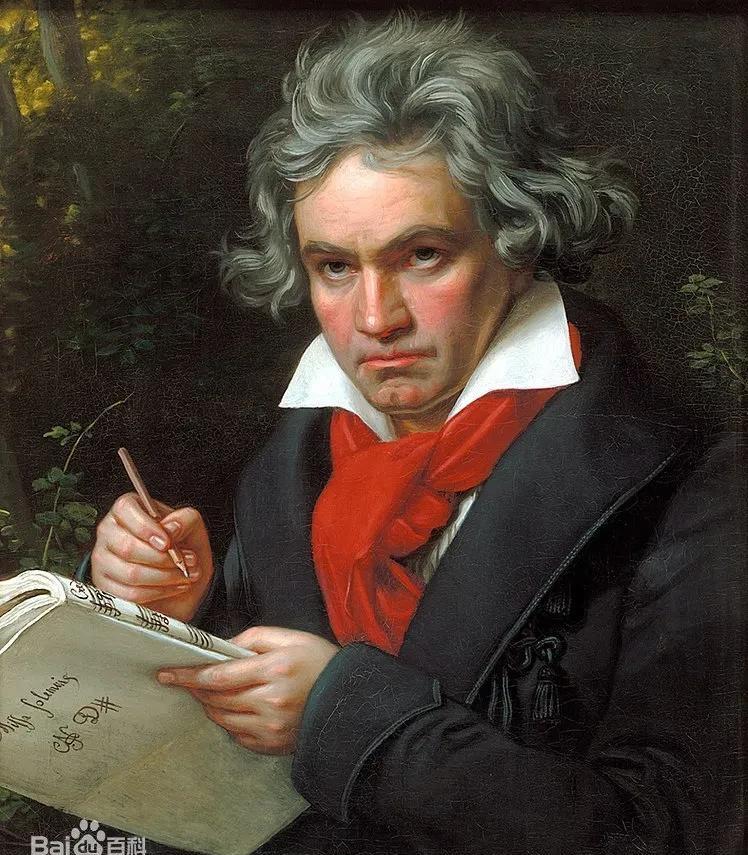Beethoven cold knowledge miscellaneous
In 1770, in the small town of Bonn on the Rhine, a musical genius who would later influence the world was born. His name was Ludwig van Beethoven.
Beethoven's life's achievements need not be repeated. However, when you walk into Beethoven's life, you will be amazed that the life of this "Le Sheng" is full of incredible dramatic stories. Today Luo Lijun will take stock of the lesser-known side of Beethoven for everyone...
#人物介绍

Ludwig van Beethoven (16 December 1770 – 26 March 1827)
Born in Bonn, Electorate of Cologne, Holy Roman Empire, he was one of the representatives of the Viennese Classical School and a composer of the European classicist period
Since there is no accurate historical evidence, for a long time, the day on which Beethoven was born has been the focus of debate. Many people take Beethoven's Baptism Day, December 17, as his birthday and commemorate his birthday on this day, although baptization day is not a birthday in the traditional concept. In addition, there are many sources that record his birthday as December 16. But in any case, 2020 ushered in Beethoven's 250th birthday. This "romantic genius" who was "half seawater, half flame" never stepped off the altar, and the name "Le Sheng" can be said to be well deserved.
#取笑观众是 "fool"
Beethoven, who moved to Vienna, soon showed extraordinary musical talent. At that time, piano improvisation was his best skill.
In the 18th century, Enlightenment ideas swept through Europe like a spark. Deeply influenced by Enlightenment ideas, Beethoven was full of contempt for authoritarian dictatorship in his bones.
Portrait of Beethoven in his youth▼
In 1795, the "Union of Great Musicians", with a Prussian royal background, held a large concert in Vienna. Beethoven was invited to participate, and this was his first public performance in Vienna.
Beethoven completed the performance with the newly written Piano Concerto in B flat major a few hours before the rehearsal. Beethoven is sometimes emotionally enthusiastic, unique and powerful, and sometimes smooth as a song, very charming. Beethoven's performance won the hearts of the audience.
When Beethoven's performance was over, he laughed in front of the praise crowd. Beethoven even made fun of the emotions that the audience felt because of his performance, saying that they were "all big fools." Sometimes Beethoven was so disgusted by the audience's inappropriate praise that he even said, "Who can live among this group of spoiled children?" After the performance, Beethoven also refused the invitation of the King of Prussia to perform in Prussia.
Beethoven is such a contradictory unity that is both humble and proud.
#"Subverting" Europe's "Intersection"
Europe at the end of the 18th century. Napoleon Bonaparte, a commander-in-chief who brought about a radical change in the political landscape of Europe; Ludwig van Beethoven – a great musician who brought subversive changes to the European music scene. In this way, the two intersected in that turbulent era.
In 1792, Napoleon, then a second lieutenant in artillery, began to make a name for himself on the battlefield. This year, Beethoven, who came to vienna for the second time in the music capital, also began to rise in the music world. The Enlightenment ideas that swept through Europe shone together the light of democracy, freedom, and equality into the hearts of these two young people. Influenced by enlightenment ideas, the magnificent French Revolution also made these two young people passionate - Napoleon made many achievements on the battlefield, and Beethoven composed a large number of magnificent symphonies.
In 1803-1804, Beethoven, inspired by the French Revolution, composed Symphony No. 3 in E flat major (the Symphony of Heroes). The work is widely regarded as a landmark work in the transition from classicism to Romanticism. Speaking of the original intention of the creation, Beethoven once said that this work was written for Napoleon, who embodied the democratic and anti-monarchical ideals of the French Revolution.
Symphony No. 3 in E flat major▼
However, what Beethoven never expected was that after the overthrow of the autocratic dynasty, Napoleon did not practice "republicanism", but declared himself emperor. Beethoven, who heard the news, angrily tore up the cover of the score. When the song was officially published, Beethoven changed the inscription to "a symphony written in honor of a great figure."
#与歌德的故事
Goethe and Beethoven, one is the great poet, dramatist and writer in German history, and the other is a world-class musician who is revered as "Le Sheng".
Perhaps because of the hero's affection, Beethoven became an admirer of Goethe's work. He once gave Goethe such praise: "Goethe's poems make me happy... I hope to draw inspiration and strength from his wisdom. ”
In 1812, two giants of German literature and art met in the picturesque Bohemian baths of Parez. Beethoven, who saw Goethe, was very excited. What happened next, however, disappointed Beethoven.
It turned out that when Beethoven was talking to Goethe, the queen, the prince, and the attendants came to their side. Beethoven had always hated these royal nobles. When the prince pretended to be very enthusiastic and saluted him, and the queen nodded to him affectionately, Beethoven threw his head up, as if he did not see anything. Goethe, on the other hand, was different. He was flattered and shook the dust on his body, sorted out his collar, took off his hat to meet him, and bent down to salute the queen and the prince.
Looking at Goethe in this way, Beethoven only felt that the image of the great poet he had previously thought of collapsed in an instant. When the royal nobles had passed by in a mighty way, Beethoven rebuked Goethe in an almost quarrelsome tone: "You are not the author of The Goetz and Faust I imagined, you are a ridiculous philistine. When Goethe heard this, even the roots of his ears turned red.
They met happily, but finally broke up angrily. Since then, they have never seen each other again...